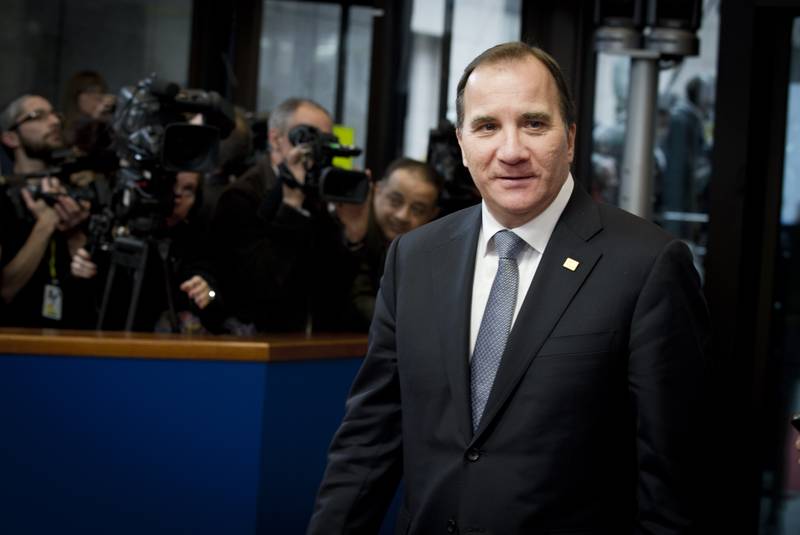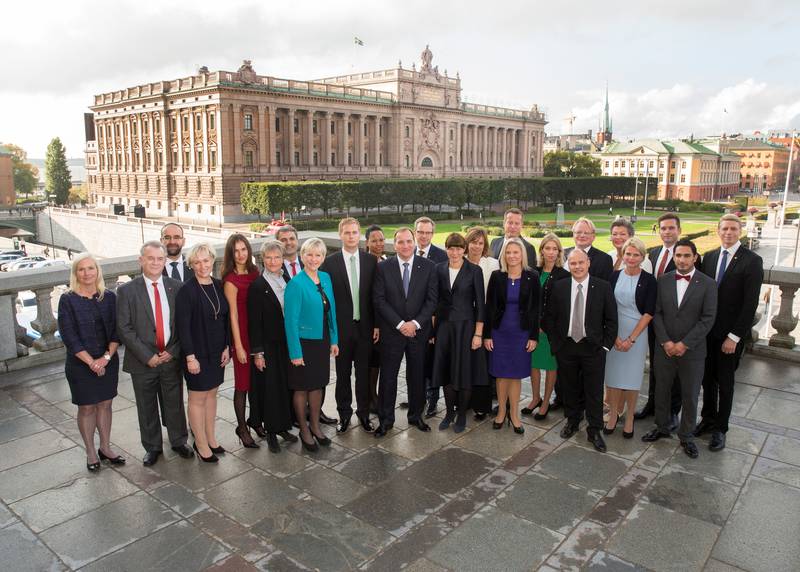Who Takes the Lead: Sweden’s Political Deadlock
Adelina Dankova, December 12, 2014
 Besides the common perception that Sweden is experiencing more peaks than valleys, the country has now entered political instability for the first time since more than two decades. The Social Democratic Party and the Green Party minority government’s resignation amid a political crisis could be perceived as quite unexpected both locally and internationally. The far-right party Sweden Democrats has supported the budget proposal, submitted by the former ruling political coalition the Alliance – (The Moderate Party, the Christian Democrats, the Liberal People’s Party and the Centre Party) in order to defeat the minority government’s budget proposal. Early elections have been announced to be held on March 22, 2015 and are the second of that type in the Swedish political history since 1958.
Besides the common perception that Sweden is experiencing more peaks than valleys, the country has now entered political instability for the first time since more than two decades. The Social Democratic Party and the Green Party minority government’s resignation amid a political crisis could be perceived as quite unexpected both locally and internationally. The far-right party Sweden Democrats has supported the budget proposal, submitted by the former ruling political coalition the Alliance – (The Moderate Party, the Christian Democrats, the Liberal People’s Party and the Centre Party) in order to defeat the minority government’s budget proposal. Early elections have been announced to be held on March 22, 2015 and are the second of that type in the Swedish political history since 1958.
“We have a completely new political map in the Swedish Riksdag”, said Prime Minister Stefan Löfven during his interview [video in Swedish language] with the Skavlan evening talk show on Swedish National Broadcasting Television. He pointed out quite clearly that he had proposed co-operation with the other political parties a few days after the regular elections in the autumn of 2014 and before the budget proposal vote in order to ensure political stability in the country by resisting the growing influence of the anti-immigration Sweden Democrats Party. However, none of the parties has expressed readiness to co-operate and find a joint solution. Thus, the possible scenarios out of the political deadlock seem no longer so unusual.
Fact sand numbers from the Swedish parliamentary elections 2014
Among the most discussed topics during the last parliamentary elections in Sweden were issues related to creating more opportunities for youth jobs, health- and elderly care, the housing market, gender equality and improvement of the ranking in the Programme for International Student Assessment (PISA). Bearing in mind the active Swedish participation in a variety of international affairs, topics related to the growing euroscepticism, the future of the banking union or the integration of the rising number of immigrants and refugees found no room during the election debates.
According to the Election Authority (Valmyndiheten), the distribution of the votes creates a different balance in the new Swedish Riksdag with a voter turnout of 85,81%, which is 1,18% higher in comparison with the previous parliamentary elections in 2010. The leading former governing party, the Moderate Party, took 23,33% of the votes; while the other parties in the coalition Alliance performed quite poorly, gaining as follows: the Centre Party - 6,11%, the Liberal People’s Party - 5,42% and the Christian Democrats - 4,57%. On the one hand, the total percentage of their votes did not allow them to receive a mandate to form a government. On the other hand, the Social Democratic Party took 31,01% and together with the Green Party (6,89%) negotiated to form a minority government, taking the risk of facing difficulties in enforcing policies. Surprisingly, the right-wing Sweden Democrats (SD) gained 12,86% of the votes and thus ranked the third largest political party in the country since ages. The 2014 election results have, beyond doubt, shown that Swedish politics has reshaped sharply and solutions are to be sought in a coalition on a larger basis.
Domestic politics – a perquisite for the government resignation
Before sinking the Swedish government by rejecting the red-green budget proposal, the Sweden Democrats gave clear signals that they insist on splitting the Green Party from the ruling coalition, boasting their own increased influence in the Swedish politics. In addition, Sweden Democrats have required Löfven to form a Social Democratic minority government as well as to present a revised budget proposal with less social costs for the growing immigrant flow. The Prime Minister did not respond and as a result the government faced the current political stalemate situation and took the swift decision to resign.
The question now is why the political parties could not agree and find a common solution in order to tackle the current issues. An optional answer can be found in the unwillingness of the political parties, except the Sweden Democrats, to put forward for discussion sensitive topics, related to the increasing amount of asylum seekers, the ability of the Swedish state to handle this flow and the integration debate. Swedish voters became hostages of the game of political correctness by politicians to whom they delegated rights. This further outlined the current political map: if the other parties fail in their search for publicity and transparency on their positions on the hot topics, Sweden Democrats will easily become the second largest political party in the Riksdag thus placing the country not only in the club of countries across Europe with rising xenophobic waves, but such a party will have the power to implement and enforce policies and directly control the Swedish politics. Part of these issues has been touched in the post-election analysis [in Swedish language] by Hans Wallmark and Per Nilsson on why the Moderate Party lost the elections. Among the major conclusions that contributed to the party’s election defeat are the lack of credible responses to the issue of employment, the welfare debate and integration policy.
The political stalemate situation does not look any better for any of the political parties, taking into consideration the latest polls. On the one hand, the Moderate Party is experiencing an internal political crisis as they need to elect a new party leader since Fredrik Reinfeldt resigned after the defeat at the last elections. The party is to hold a congress earlier in January 2015. Among the favourites for the Moderate Party’s leader is Anna Maria Kinberg Batra. She was a chairman of the Committee on European Affairs (2007-2010) and the Committee on Finance (2010-2014) and before her political career she worked actively in the field of public relations and communication. She is well known in Sweden with her strong feminist values and activities. She is married to the Swedish stand-up comedian David Batra, born to a Swedish mother and a father of Indian origin.
The other political parties in the former Alliance coalition have not received stable votes and therefore they need to search for opportunities to support and/or participate in a coalition on a larger basis. On the other hand, the Sweden Democrats do not seem all that stable since their leader Jimmie Åkesson is on a sick leave for a fatigue syndrome. The party needs to justify its rhetoric in order to find supporters among the other political parties. Nevertheless, for the next elections all the political parties have to come up with clear messages - how the living standard and the Swedish welfare system will be improved for the Swedish citizens. Otherwise, the election results might be even worse.
Hot topics for the Swedish politics: NATO membership and the integration debate
The fragile global political agenda requires new ways for decision-making. Sweden is an active EU and UN member, participating in several UN peacekeeping operations since the 1960s and was three times member of the UN Security Council (1957-1958, 1975-1976 and 1997-1998). The rapid and ongoing developments in war zones such as Syria, the increasing tension between Ukraine and Russia and the official information that Russian submarines have violated Swedish territorial waters in mid-November 2014 challenge the Swedish politics both internally and externally.
According to sources of the Swedish daily Aftonbladet, quoting [in Swedish language] the Amnesty International, Sweden is the EU country, which has accepted the biggest number of Syrian refuges during the last three years - 50 235 people. Second place is ranked Germany with 46 265 asylum-seekers and the Netherlands with 10 000. Other EU countries with stable economies and governments such as Finland, Norway, Denmark, and Austria are lagging quite behind. In addition, the number of asylum-seekers in Sweden and Germany constitute 64% of all the asylum applications within EU. Years of fruitful and stable Nordic co-operation in the military and defence field tend to become no longer a sufficient prerequisite for protection of national sovereignty. Moreover, the membership in NATO was intentionally avoided during the election campaigns by all the political parties. Thus, taking into account these preconditions, Sweden’s NATO membership and the integration debate turned out viral in the domestic and foreign political discourse.
What now?
Sweden, in a long-term perspective, needs to justify the government’s choice to recognise the State of Palestine (first among the EU nations), the country’s NATO membership, the integration debate, strengthening the state treasury in order to come up with a stable budget proposal, acceptable for the majority as well as to tackle the country’s macroeconomic imbalances in harmony with the EU legislation framework. According to the 2014 European Economy Report by the European Commission, Sweden has to undergo changes and to implement mechanisms in order to fight the macroeconomic imbalances such as the indebtedness of the private sector and in particular  household indebtedness; inefficiencies in the Swedish housing market, the deteriorating exports market share and rebalancing the current account surplus.
household indebtedness; inefficiencies in the Swedish housing market, the deteriorating exports market share and rebalancing the current account surplus.
If the parties do not communicate clearer messages to the voters in terms of security and defence policies, the integration debate, measures to increase the national treasury and improving the country’s ranking in the PISA Index as a response to the clear and rigid Sweden Democrats rhetoric, the solution out of the political deadlock will remain blurry.
If the Social Democrats win the next elections with a thin result, they will face a similar stalemate situation again - urged to form a clear Social Democratic minority government or a coalition minority government, involving both the Left and the Green parties. There is a slight possibility for them to envisage a co-operation with other parties from the Alliance amid the political stability as some of the signals are directing to. If the Alliance coalition wins, it is most likely that Anna Maria Kinberg Batra will become the first female prime minister in the traditionally equally gendered Sweden, who will introduce her feminist approach to all the internal and foreign affairs. The actual co-operation is more than needed now in the Swedish politics than ever in its political history.